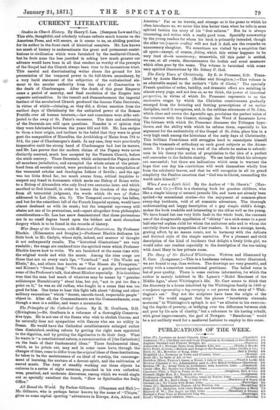CURRENT LITERATURE.
Studies in Church History. By Henry C. Lea. (Sampson Low and Co.) This able, thoughtful, and scholarly volume reflects much honour on the American Press, and will secure, as it seems to us, an abiding position for its author in the front rank of historical essayists. Mr. Lea knows too much of history to underestimate the great and permanent contri- butions to civilization which were furnished by the mediaeval Church, but he feels none the less justified in asking how much greater our advance would have been in all that renders us worthy of the precepts of the Gospel had the Church always been trite to its momentous trust. This careful and discriminating writer clears the ground for his presentation of the temporal power in its full-blown ascendancy, by a very lucid statement of the subjection of the ecclesiastical ele- ment to the secular authority from the days of Constantine to the death of Charlemagne. After the death of this great Emperor came a period of anarchy, and final resolution of the Empire into separate nationalities. In the tumult and dismemberment the imperial instinct of the secularized Church produced the famous False Decretals, in virtue of which—claiming, as they did,.a divine sanction from the earliest days of Christianity for the unlimited power of the Roman Pontiffs over all human interests,—law and conscience were alike sub- jected to the sway of St. Peter's successor. The date and authorship of the Decretala are still open questions. Neander is of opinion that they were fabricated between the years 633 and 636. Mr. Lea assigns to them a later origin, and inclines to the belief that they were in great part the composition of Rinculfus, the Archbishop of Mainz from 784 to 814, the year of Charlemagne's death. In any case, they were practically inoperative until the strong hand of Charlemagne had lost its terrors, and Mr. Lea proves that the modern claims of the Papacy were never distinctly asserted, much leas accepted by the Western Church, before the ninth century. These Decretals, which enthroned the Papacy above all mundane jurisdiction, and exempted the whole estate of the priest- hood from all secular control, were proclaimed to be the compilation of the venerated scholar and theologian Isidore of Seville ; and the age was too little fitted for, too much averse from, critical inquiries to suspect any fraud in documents which made one Bishop of Rome write to a Bishop of Alexandria who only lived two centuries later, and which ascribed to God himself, in order to insure the freedom of the clergy from all terrestrial judgment, the words which the men of Sodom addressed to Lot (Gen. six. 9). The Temporal sovereignty has fallen, and but for the coincident fall of the French Imperial system, would have almost deafened us with its crash; but the temporal supremacy still abates not one of its pretensions, and—apart altogether from philosophic considerations—Mr. Lea has snow demonstrated that these pretensions are in no small degree based upon the boldest and most shameless forgery which is to be found in the records of history.






























 Previous page
Previous page